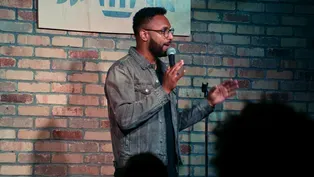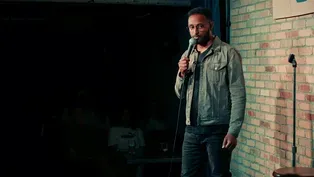
Comedy as Therapy: An Immigrant's Journey
Clip: Episode 1 | 3m 10sVideo has Closed Captions
Jesus Trejo and Ali Sultan discuss anxiety, therapy and using comedy to reframe traumas.
Jesus Trejo and Ali Sultan share their journeys with anxiety and therapy, highlighting the significance of professional support. They delve into their immigrant upbringings and the weight of expectations for success. Despite facing cultural taboos, they turn to comedy as a means to reinterpret their traumas, empowering themselves to shape their own stories.
Problems with Closed Captions? Closed Captioning Feedback
Problems with Closed Captions? Closed Captioning Feedback

Comedy as Therapy: An Immigrant's Journey
Clip: Episode 1 | 3m 10sVideo has Closed Captions
Jesus Trejo and Ali Sultan share their journeys with anxiety and therapy, highlighting the significance of professional support. They delve into their immigrant upbringings and the weight of expectations for success. Despite facing cultural taboos, they turn to comedy as a means to reinterpret their traumas, empowering themselves to shape their own stories.
Problems with Closed Captions? Closed Captioning Feedback
How to Watch Roots of Comedy with Jesus Trejo
Roots of Comedy with Jesus Trejo is available to stream on pbs.org and the free PBS App, available on iPhone, Apple TV, Android TV, Android smartphones, Amazon Fire TV, Amazon Fire Tablet, Roku, Samsung Smart TV, and Vizio.
Buy Now
Providing Support for PBS.org
Learn Moreabout PBS online sponsorshipJesus: Have you always taken to soccer specifically for your mental health?
So I have anxiety.
That kind of used to be my baseline for a long time.
Like, I was, like, just anxious all the time.
Sure.
Did some therapy, and then my therapist was telling me that when you do have, like, a panic attack, it's your fight or flight.
Correct.
So if you actually flight, if you run, you move the feeling.
Oh, interesting.
Ali: It's about being present, being in the moment and taking care of this one thing at a time.
I'm a lot happier, like, due to therapy and exercise.
I have anxiety.
When you have anxiety, you get bad advice all the time, OK?
I asked one of my family members, I said, "Hey, man.
I'm going through panic attacks.
Do you have any advice?"
And his advice was, "Stop acting like a white boy."
[Laughter] That would get a bigger laugh if this was not a white crowd.
[Laughter] Jesus, voice-over: Therapy is a big thing.
It's like, there's a lot of stigma around it, right?
Ali: There's a lot of sigma, which is kind of funny to me.
I feel like it's worse to be burdening people with your trauma, with whatever, you know what I mean?
Don't burden your barber, OK, with your problems.
Right.
Yeah.
Go see a professional.
Leave the barber alone.
That's why your lineup's all messed up.
It's like, "Oh!
He messed me up.
He messed up my beard for a reason."
A hundred percent.
♪ Ali: For me, I had some childhood traumas.
I grew up fatherless.
My mom had my sister when she was 14, 15.
She had me, maybe 17, 18.
Jesus: Wow.
Ali: When she came to the States, she applied for me and my sister to come to the States, and it took about four years.
I lived in Ethiopia in that time.
Language, culture, friends were all in Yemen, so I had to, like, live in a new place, new language.
So that period of separation, you know what I mean, you're not going to feel that much support.
What gave you the confidence to go seek out therapy?
Because, you know, I'm a first-generation, as well.
I remember being hyper-aware to my parents'...
Absolutely.
financial situation and the hard work, the double jobs that they worked, so that comes with its own-- And they're immigrants, also, so they...
They're immigrants.
probably went through, like, a harsher life.
A way harsher life, and there was always this pressure.
It's like, "We're doing all this so you can have a better life."
It's like, "Oh, damn.
No pressure," you know?
Sometimes they look at kids, it's like, "Oh, they're just kids.
They don't understand."
Nah, man.
No.
I feel like I was the smartest version of myself when I was a kid.
Yeah, man!
You are almost smarter because you haven't numbed your emotions yet.
Man, as you're saying that, it took me years to be OK with my-- on my own, like, that journey of seeking out help, getting therapy.
Whenever I would kind of share this therapy thing with, like, a family member, they'd be like, "Wait.
What are you doing?
We don't tell other people our business."
You know, Did you ever deal with-- Ha ha!
Why are you snitching, Huh?
Yeah.
"Why are you snitching on us, man?
That's for us."
Ha ha!
I don't know if you feel this way, but I'm so grateful that I found comedy.
It's you controlling the narrative of your life.
Well, I feel like comedy is, like, this lived experience accounting, right, in the sense that you take this thing that maybe was a debit, you know, to you and becomes a credit, it becomes this, like, an asset...
Absolutely.
something where I can relate to, you know, getting held at gunpoint as a kid.
It's like, that, when it happened, was so terrible.
Yeah.
But I talk about it in my act and it was just like-- Now it's your closer.
Video has Closed Captions
In Minneapolis, Jesus meets Yemeni comic Ali Sultan who opens up about his mental health. (30s)
Minneapolis Comedy: Diversity & Community
Video has Closed Captions
Jesus Trejo and Ali Sultan discuss the Minneapolis comedy scene, including its diversity. (1m 49s)
Providing Support for PBS.org
Learn Moreabout PBS online sponsorship












